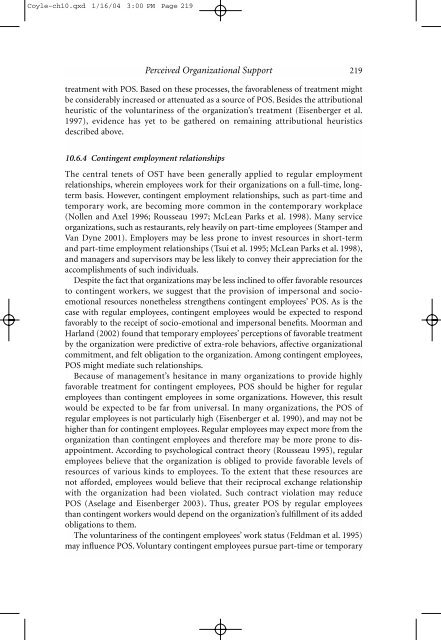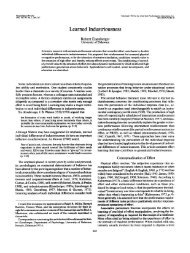Perceived Organizational Support
Perceived Organizational Support
Perceived Organizational Support
Create successful ePaper yourself
Turn your PDF publications into a flip-book with our unique Google optimized e-Paper software.
Coyle-ch10.qxd 1/16/04 3:00 PM Page 219<br />
<strong>Perceived</strong> <strong>Organizational</strong> <strong>Support</strong> 219<br />
treatment with POS. Based on these processes, the favorableness of treatment might<br />
be considerably increased or attenuated as a source of POS. Besides the attributional<br />
heuristic of the voluntariness of the organization’s treatment (Eisenberger et al.<br />
1997), evidence has yet to be gathered on remaining attributional heuristics<br />
described above.<br />
10.6.4 Contingent employment relationships<br />
The central tenets of OST have been generally applied to regular employment<br />
relationships, wherein employees work for their organizations on a full-time, longterm<br />
basis. However, contingent employment relationships, such as part-time and<br />
temporary work, are becoming more common in the contemporary workplace<br />
(Nollen and Axel 1996; Rousseau 1997; McLean Parks et al. 1998). Many service<br />
organizations, such as restaurants, rely heavily on part-time employees (Stamper and<br />
Van Dyne 2001). Employers may be less prone to invest resources in short-term<br />
and part-time employment relationships (Tsui et al. 1995; McLean Parks et al. 1998),<br />
and managers and supervisors may be less likely to convey their appreciation for the<br />
accomplishments of such individuals.<br />
Despite the fact that organizations may be less inclined to offer favorable resources<br />
to contingent workers, we suggest that the provision of impersonal and socioemotional<br />
resources nonetheless strengthens contingent employees’ POS. As is the<br />
case with regular employees, contingent employees would be expected to respond<br />
favorably to the receipt of socio-emotional and impersonal benefits. Moorman and<br />
Harland (2002) found that temporary employees’ perceptions of favorable treatment<br />
by the organization were predictive of extra-role behaviors, affective organizational<br />
commitment, and felt obligation to the organization. Among contingent employees,<br />
POS might mediate such relationships.<br />
Because of management’s hesitance in many organizations to provide highly<br />
favorable treatment for contingent employees, POS should be higher for regular<br />
employees than contingent employees in some organizations. However, this result<br />
would be expected to be far from universal. In many organizations, the POS of<br />
regular employees is not particularly high (Eisenberger et al. 1990), and may not be<br />
higher than for contingent employees. Regular employees may expect more from the<br />
organization than contingent employees and therefore may be more prone to disappointment.<br />
According to psychological contract theory (Rousseau 1995), regular<br />
employees believe that the organization is obliged to provide favorable levels of<br />
resources of various kinds to employees. To the extent that these resources are<br />
not afforded, employees would believe that their reciprocal exchange relationship<br />
with the organization had been violated. Such contract violation may reduce<br />
POS (Aselage and Eisenberger 2003). Thus, greater POS by regular employees<br />
than contingent workers would depend on the organization’s fulfillment of its added<br />
obligations to them.<br />
The voluntariness of the contingent employees’ work status (Feldman et al. 1995)<br />
may influence POS. Voluntary contingent employees pursue part-time or temporary



